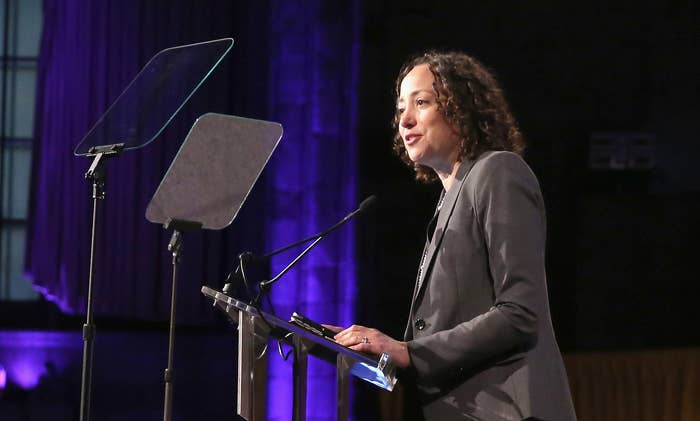
WASHINGTON — Among those watching the US Senate’s Tuesday night meltdown over Sen. Elizabeth Warren reading a letter from the widow of Martin Luther King Jr. was the newly-named chair of the US Civil Rights Commission, Catherine Lhamon.
Six weeks into her job as leader of the watchdog agency, Lhamon was perturbed.
“I am stunned by the notion that reading a letter from Coretta Scott King would demean the dignity of the Senate and would cause one senator to be censored,” Lhamon, who has spent nearly two decades as a civil rights lawyer, told BuzzFeed News. “If we are that thin-skinned about our ability to share views, about the core civil rights obligations of a potential attorney general, we are in dangerous times.”
The US Civil Right Commission was formed in 1957 to observe the implementation of civil rights laws after the enactment of the Civil Rights Act, and document discrimination by federal agencies. Though it cannot enforce laws, it is regarded as bipartisan witness and fact-finder on federal agency activities, and played a leading role in spurring the Civil Rights movement.
Until December, Lhamon headed the civil rights office at the US Department of Education. With that appointment ending, President Obama named her to lead the US CCR as its 11th chair.
Under President Trump, observers say the commission’s work is of particular significance.
“This is a moment that requires that the agency turn to its historic role and mission,” Kristen Clarke, president of the Lawyers’ Committee for Civil Rights Under Law, told BuzzFeed News.
Lisa Crooms-Robinson, professor at Howard University School of Law, told BuzzFeed News that the commission “has an especially important and perhaps heightened obligation” to continue its work now.
“A combination of the current administration and Congress foreshadows a rocky road, at the very least, for civil rights enforcement and accountability,” she said.
For now Lhamon is guarded in describing her own goals as the agency’s newest chief.
“We are increasingly hearing rhetoric around the country — including from our national leaders — that is distressing to me, and inconsistent with our national ideals,” Lhamon said.
She’s been watching the legal fight over Trump’s executive order that restricted travel for citizens of seven majority-Muslim countries carefully.
“The president’s statements and some of his proxy statements about the goals of that executive order raise very serious concerns to me about religious freedom, about national origin discrimination, about faithfulness to our ideals as a country,” she said.
Clarke, who described Lhamon as a “no-nonsense leader,” hopes the commission will turn its attention to voting rights soon, an issue on which she said, “the public narrative has been hijacked with the focus on voter fraud — which does not exist.”
“The Commission may be the only place within the government where you’ll be able to get a fairly accurate and objective picture of what’s going on the ground in terms of [people] being able to exercise their civil and human rights,” Crooms-Robinson said.

In the last decade, the commission, along with its state offices, has published reports on sexual assault in the military, condemned the conditions under which undocumented immigrants are detained at border facilities, and is currently updating a decades-old report that listed all the ways the federal government was falling short on its promises to Native American tribes.
In December, days before the US Army Corps of Engineers announced that they would not grant permission to build the Dakota Access pipeline under the Standing Rock Sioux tribe’s primary water source, the commission dispatched a team to observe the activities at the campsite.
The tribe’s victory proved to be short-lived: Following an executive action taken by President Trump in January, the Corps iced its plans to study the environmental impact of the pipeline, and indicated they would grant permission to pipeline builder Energy Transfer Partners as soon as this week.
Lhamon believes skipping the environmental study is a mistake. “I am very distressed about that about-face,” she said.
Among her first tasks as chair, Lhamon is setting up the commission, which typically publishes four or five reports a year, to respond more swiftly to events. “I’m for increasing productivity and I have a track record of having done that in the past,” Lhamon said.
But Congress hasn’t upped funding to the agency in nearly two decades, and its staff roster has shrunk from over 200 in the mid-1980s to just under 40 this year.
“Without question the commission would benefit from additional dollar resources,” Lhamon said. Key hires would be scientists and statisticians.
Lhamon said she would prioritize field hearings in the communities where the commission is reviewing charges of civil rights violations, and also have commissioners travel to attend them.
These trips were frequent in the agency’s better funded spells, until the 1980’s, and were particularly critical in gathering evidence that helped pass voting right laws in the 1960’s. Commissioners documented personal stories of voter intimidation, a lack of state data about voting demographic, and a variety of barriers that prevented African Americans from registering to vote in states in the South in that era.
“We as a nation wouldn’t have known we needed to do better — we as a nation wouldn’t have known what the actual experience of rural Mississippi black residents was,” she said.
“It’s a problem that we are so infrequently able to do what the commission did when they went to Standing Rock. With the funding that we have, [that] is extraordinarily rare.”
